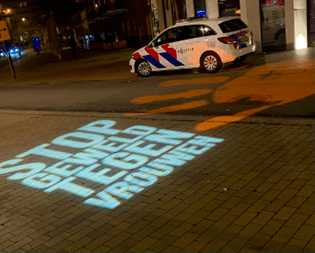Orange the World

By Frouke Prüst
My piece this week is not entirely related to the Holiday Season, but about a subject, I find, is worth the attention. Some of you reading this might have noticed this ‘Orange the World’ logo projected onto the floor right in front of De Hoek, here in the city center of Groningen. If you missed that, you may have noticed some campaign coasters or university buildings turning orange. This is all in honor of the Orange the World campaign that reoccurs yearly on November 25th, the international day against violence against women, for a ten-day lasting campaign. In more than 100 countries, government buildings turn orange to raise awareness about gender-based violence.
I got introduced to the campaign while working on a research paper in high school focusing on (adult) victims of domestic abuse. Writing my paper, I was exposed to how prevalent the problem of gender-based violence actually is. From my experience, the subject is a big taboo in the Netherlands. I only noticed how little we talk about it once I moved to Argentina for a year. The amount of femicides in Argentina is shocking; roughly every 35 hours, a woman gets killed in the country. But what I found most intriguing, was noticing most of these femicides being talked about in the national news. It’s talked about in schools, at the dinner table, and among friends. Seeing feminist street art around every corner is not unusual, reading names of murdered women and girls. The subject is often a trending topic in South America, at least from my own experience. In the Netherlands, a femicide occurs every 8 days. Every 8 days, a woman is killed by her (ex)-partner. And, considering we are a much smaller country, with about 1/3 of Argentina’s population, this is an extremely high number. Femicides are of course not the only form of violence women face, but these numbers show just how prevalent the issue is in the Netherlands. Unfortunately, I don’t see nearly enough attention for it in our society. And awareness is the first step to putting change in action. We talk about women’s rights, but when we do, it’s questioning foreign policies. I feel like we keep silent about the severity of gender-based violence at home, coming from a sense of pride, thinking we are very ahead in gender-equality cases compared to the rest of the world. That’s why I’m happy with the effort of the United Nations to hold this annual campaign and making violence against women a more accessible topic of conversation in our day-to-day lives.
What I hope to accomplish with sharing my writing is for all readers to give thought to this issue. Talk about it, acknowledge the problem, and help the fight along. In whatever way you can. Thanks for reading!
